I could feel – I could smell – a new kind of intelligence across the table.
Gary Kasparov
AI in IT is a concept that determines the future and everything that it holds. AI has not only transformed traditional computing methods but has also been penetrating into many industries, significantly transforming them. As the world becomes more digitized and all industries become much smarter, IT companies must keep pace with exploding process complexity and accelerating innovations.
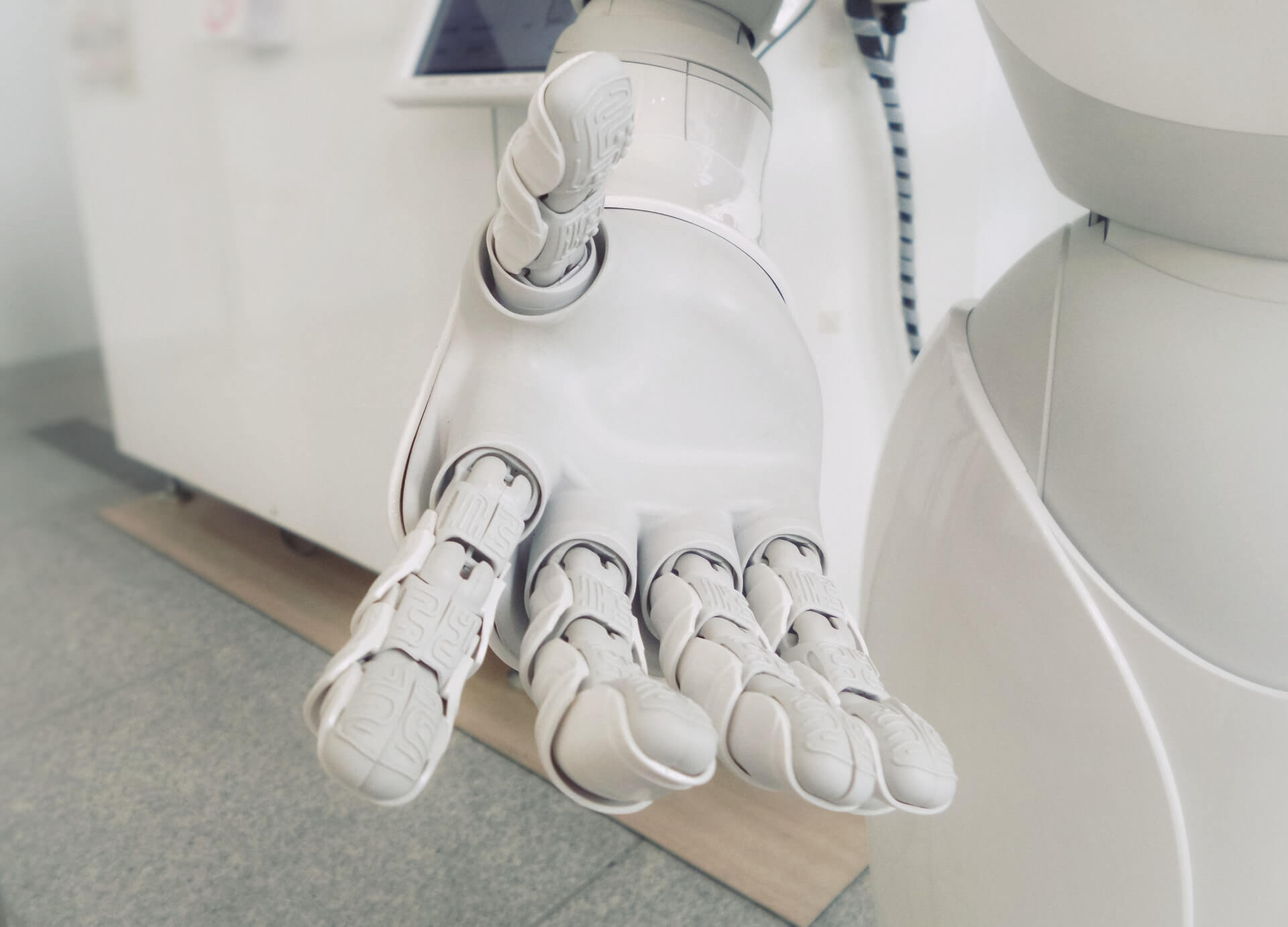
IT Industry: AI at the Forefront
The IT industry is faced with a tricky balancing act: driving innovative initiatives while grappling with the side effects of traditional infrastructures. As the IT infrastructures become more complex and clients -more sophisticated, IT is forced to look for the most effective solutions to enhance IT operations management and accelerate problem resolution in complex modern IT environments. AI, being a tremendous breakthrough, has found great use in the diverse, dynamic, and difficult-to-manage IT landscape.
According to IDC, by 2027, global spending on AI systems will reach more than $500 billion.
AI Technologies for IT
Artificial Intelligence, abbreviated as AI, is a branch of computer science that creates a system able to perform human-like tasks, such as speech and text recognition, content learning, and problem-solving. Using AI-powered technologies, computers can accomplish specific tasks by analyzing huge amounts of data and recognizing these data recurrent patterns.
According to a study by Transparency Market Research (TMR), the global market for artificial intelligence is estimated to gain an impressive 36.1% CAGR between 2016 and 2024, increasing by the end of 2024 from $126.14 billion in 2015 to $3,061.35 billion.
AI: Technology Segments
Being an umbrella term, AI can be divided into different technology segments, such as machine learning, deep learning, natural language processing, image processing, and speech recognition. However, a central role in the IT industry belongs to machine learning and deep learning.
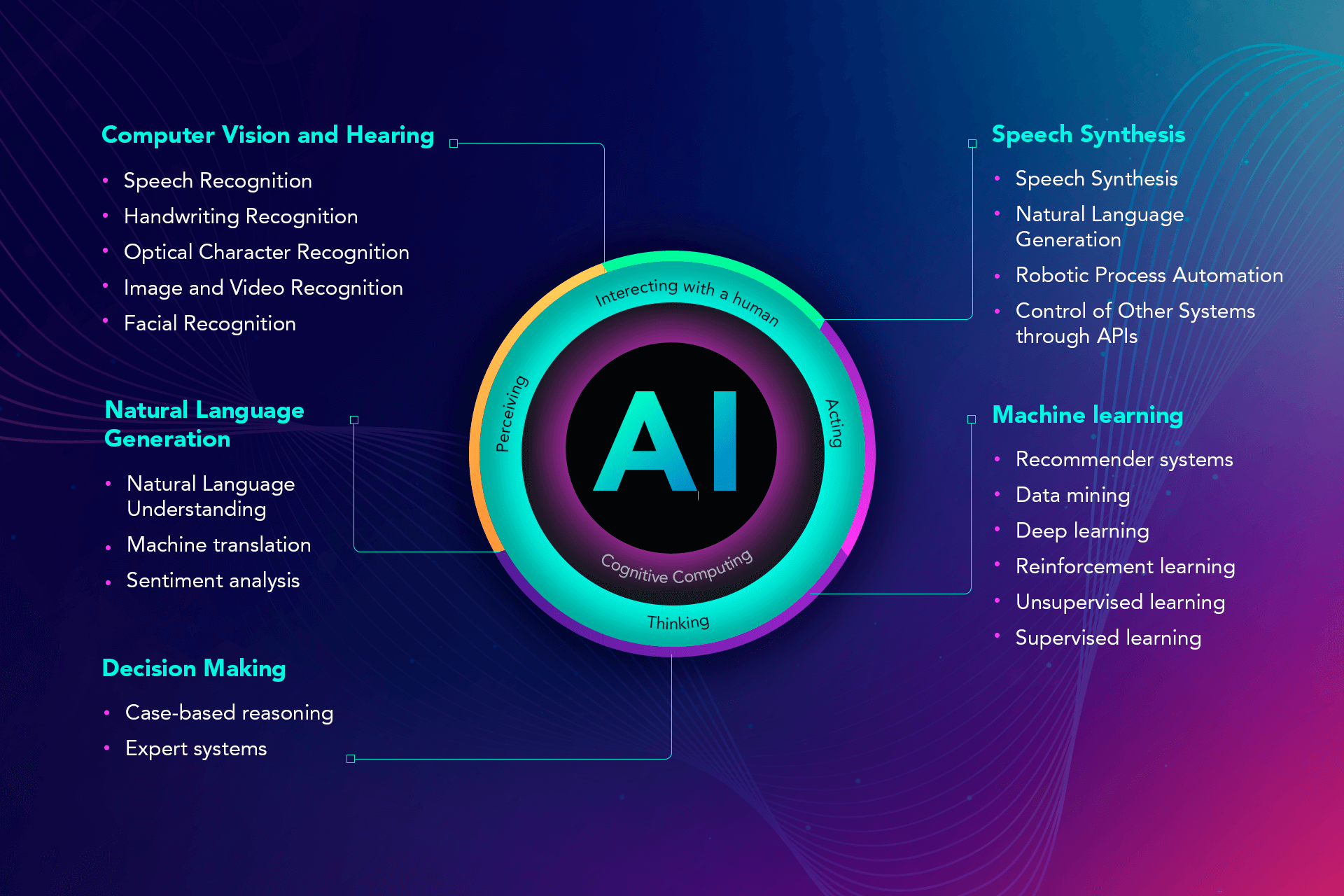
Read more about IT solutions in the time of COVID-19.
Machine Learning
The essence of intelligence is learning. Machine learning (ML) is a subset of AI, which focuses on a computer program that is able to parse data using specific algorithms. Such a program modifies itself without human intervention, producing the desired output based on analyzed data. In essence, using ML techniques, a machine is trained to analyze huge amounts of data and then learn to perform specific tasks.
Deep Learning
Deep Learning (DL) is a subset of ML whose algorithms and techniques are similar to machine learning but whose capabilities are not analogous. In DL, a computer system is trained to perform classification tasks directly from sounds, texts, or images by using a large amount of labeled data, as well as neural network architectures.
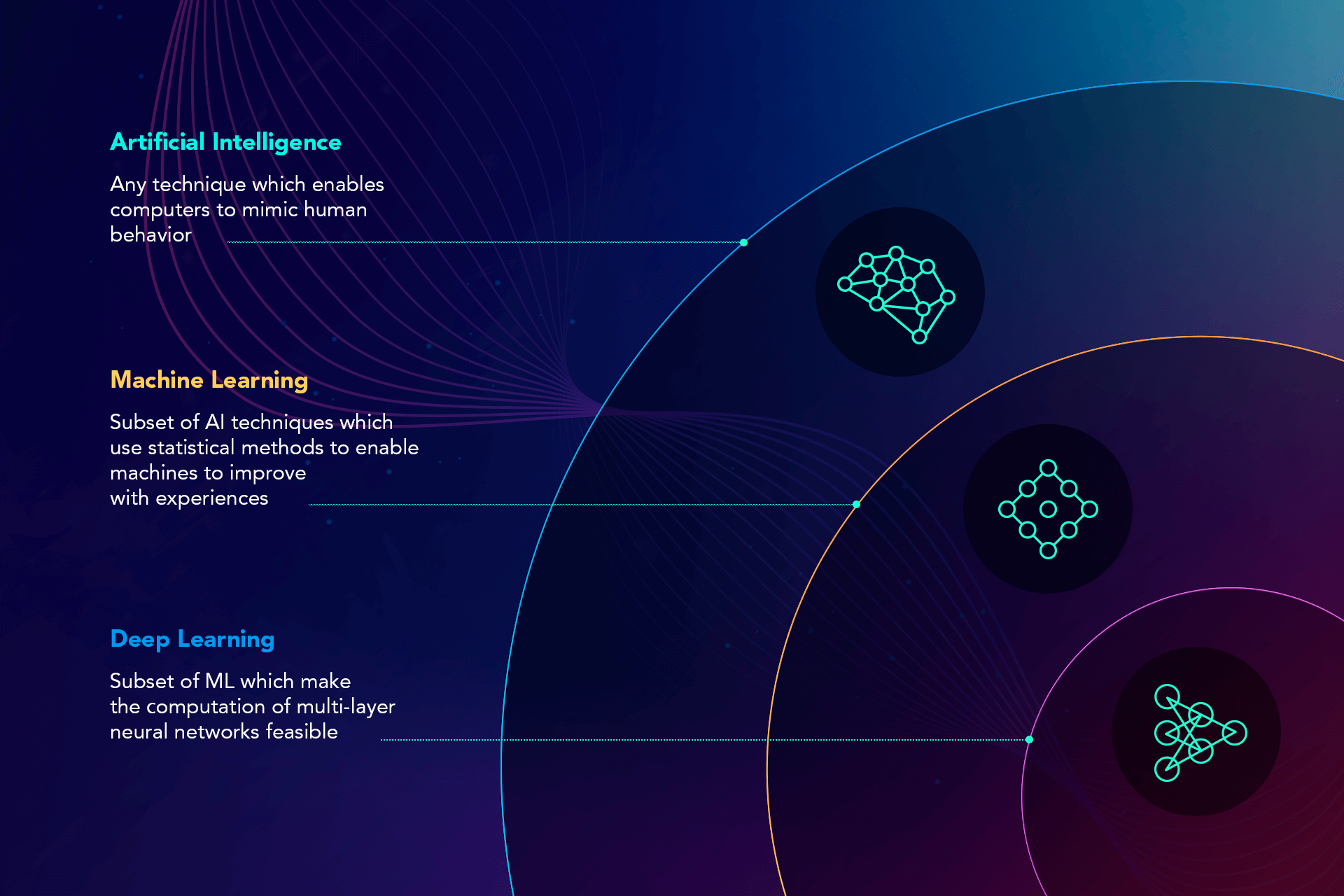
Natural Language Processing
Natural Language Processing (NLP) allows AI to understand and manipulate natural language as humans do. It offers the possibility of computers reading text or interpreting spoken words with the same ease and fluidity, despite the inherent complexity. NLP relies on two basic concepts: Natural Language Understanding and Natural Language Generation. These two engines power chatbots and intelligent virtual assistants to communicate with users. Moreover, sentiment analysis driven by NLP has proved to be a useful tool in IT.
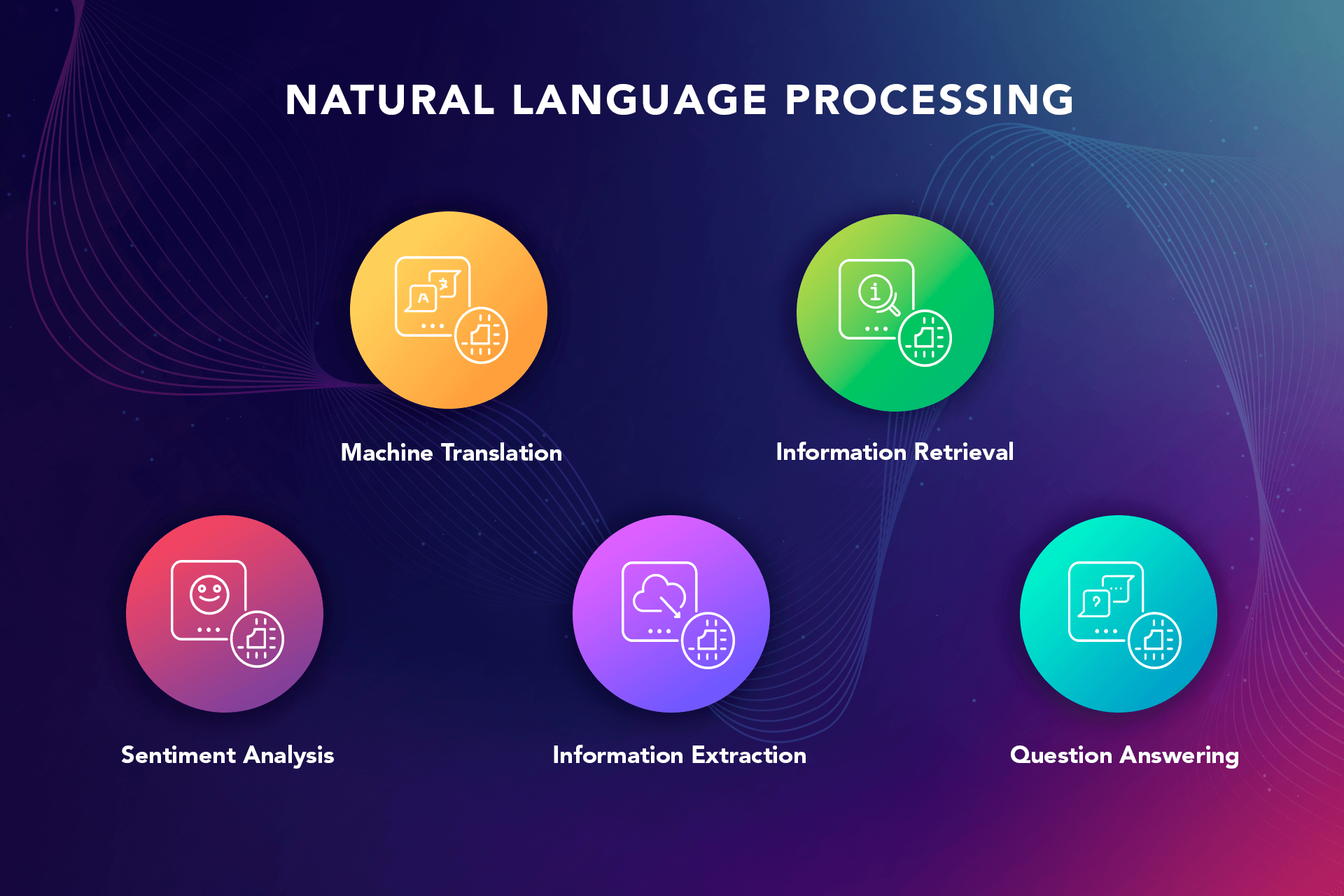
Computer Vision
Computer vision allows AI to derive meaningful insights from digital images, videos, and other visual content. Based on the extracted information, the AI system can take action or make recommendations. If AI enables computers to think, computer vision enables them to see, observe and understand.
Read more about the Digitalization of Documents with AI.
AI Applications in IT
In the IT industry, AI-driven applications are used in 3 major areas: Quality Assurance, Service Management, and Process Automation.
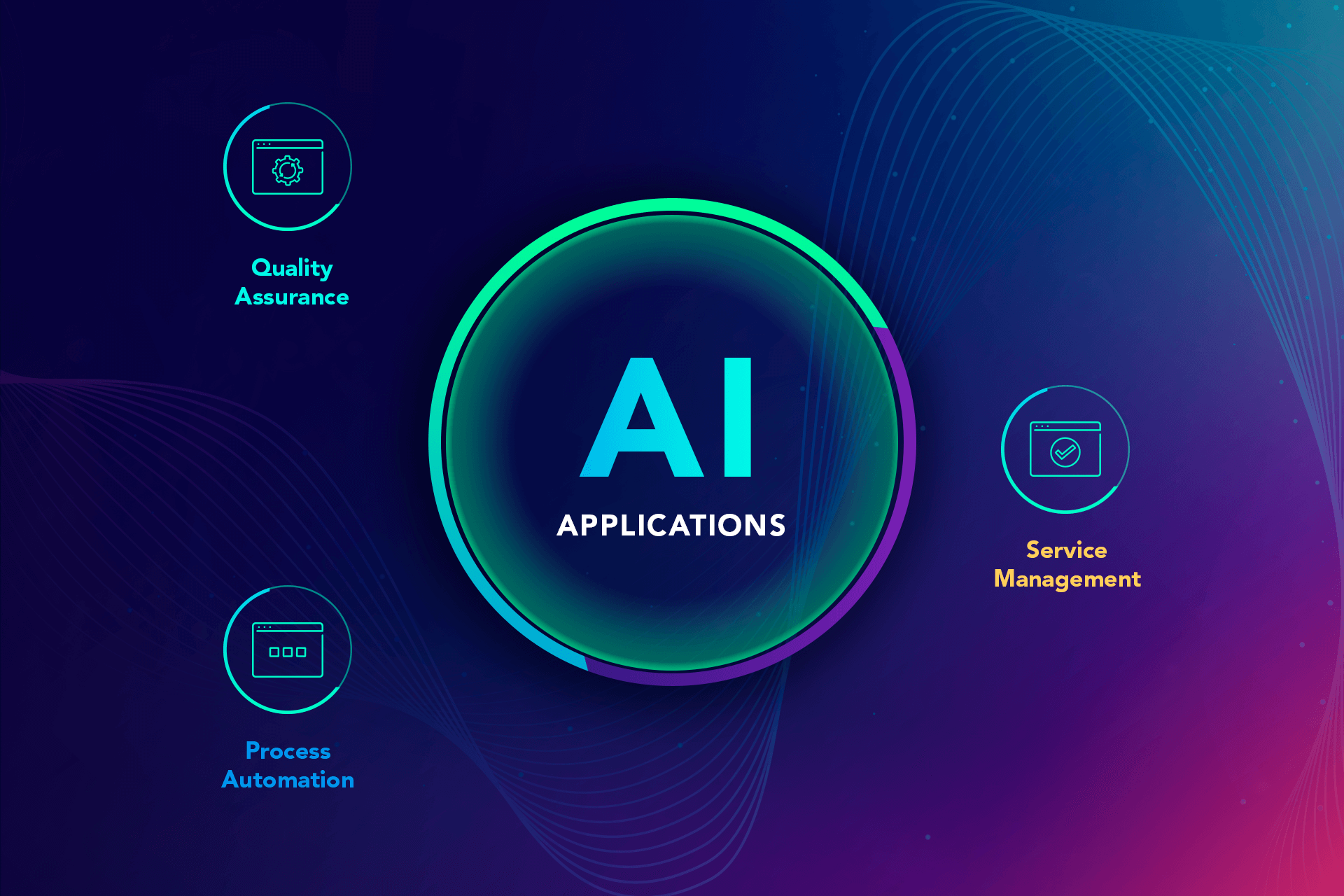
AI for Quality Assurance: Software Testing for QA
Each time a development team introduces a new code, it has to test it before letting this code enter the market. Regression testing cycles take a lot of effort and time if it is manually done by QA experts. With the ability of AI to determine repetitive patterns, this process can be run easier and faster. Using AI for data analysis allows QA departments to eliminate human errors, reduce running test time, and easily identify possible defects. As a result, a QA team is not overloaded with large amounts of data to handle.
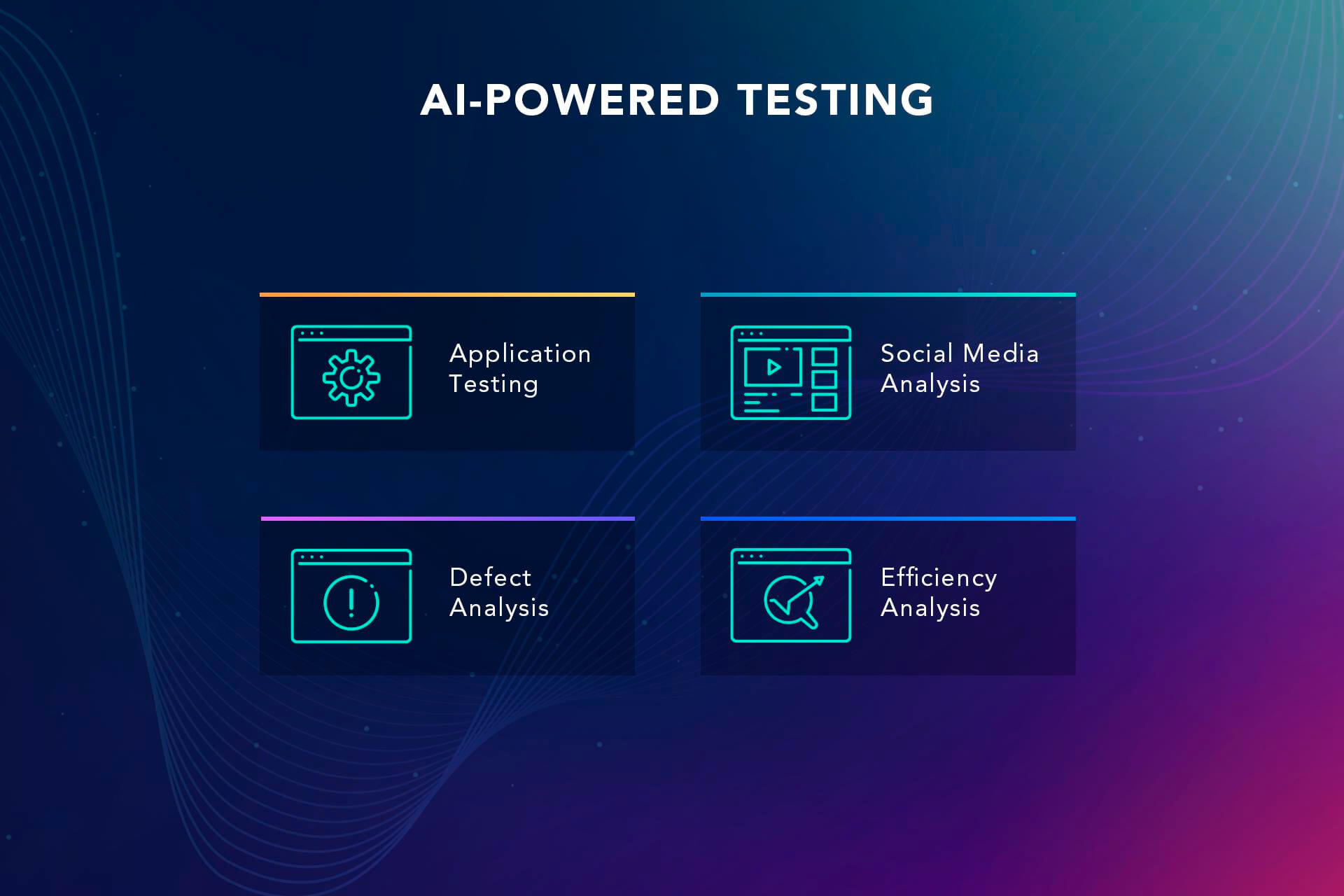
Application Testing
An AI-based system builds test suites by processing behavioral patterns according to location, device, and demographics. This allows QA departments to facilitate testing processes and enhance the effectiveness of an application.
Social Media Analysis
AI systems are able to process and analyze huge amounts of data gained from social media. Based on these data, the system can predict market trends and customer behavior, therefore providing a company with a competitive advantage.

Defect analysis
AI systems monitor and analyze data and then compare them to prescribed parameters in order to detect errors or areas that require special attention. If the system detects a problem or an error, it generates a warning. Additionally, the AI system is able to perform a deep analysis of occurred errors, defining areas most apt to defects as well as providing possible solutions for further optimization.
Efficiency analysis
By analyzing and summarizing relevant information from a large range of sources, an AI system provides QAs with valuable information, giving QA engineers a complete view of the alterations that they must carry out. Using this information, QAs can make more informative decisions.
AI for Service Management
AI technology is also widely used in service management. Leveraging AI for service automation allows companies to utilize their resource more effectively, making service delivery faster, cheaper, and more effective.

Self-solving service desk
Today, AI, with its machine learning capabilities, offers IT companies a self-solving service desk, which is capable of analyzing all the company input data and, as a result, providing users with proper suggestions and possible solutions. By applying AI, companies are able to track user behavior, make suggestions, and consequently provide self-help options to make service management more effective. In this case, AI ultimately gives users a better experience through improved self-service.
ML and DL capabilities of AI allow the system to analyze a request submitted to a service desk. The AI system finds out concurring requests, compares newly submitted with previously resolved ones, and then based on past experience, gets an instant understanding of which solution to opt for.
Being a powerful business tool, AI assists an IT team in operational processes, helping them to act more strategically. By tracking and analyzing user behavior, the AI system is able to make suggestions for process optimization and even develop an effective business strategy.
AI for Process Automation
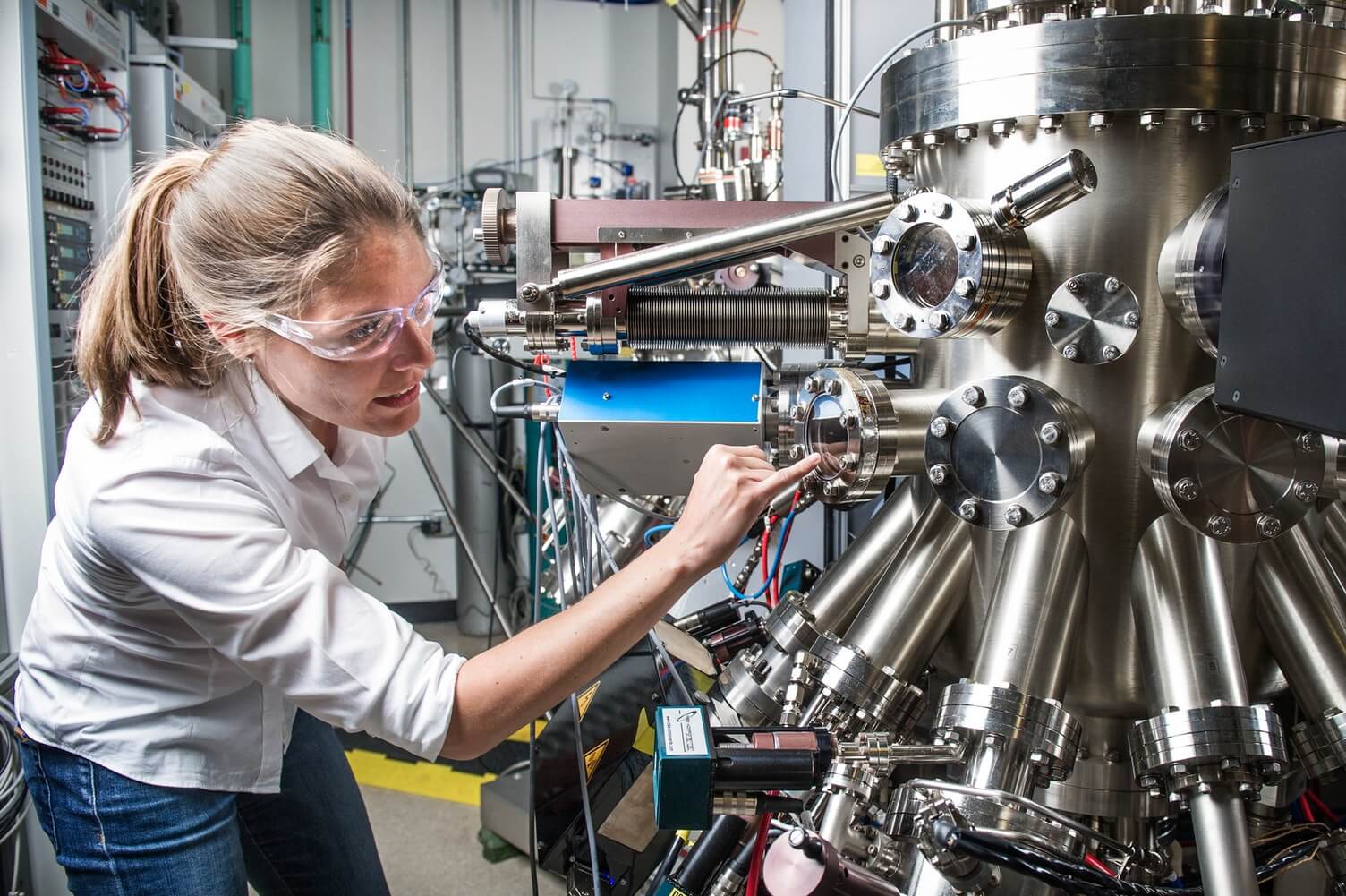
Humans and manual processes can no longer keep pace with network innovation, evolution, complexity, and change. The next evolution of automation is AI. Various business processes will become smarter, more aware, and more contextual. AI-powered automation will allow IT companies to easily automate many operational processes, reducing expenses and minimizing manual work. IT process automation can be used to streamline various IT operations in a vast number of situations, replacing repetitive manual tasks and business processes with automated solutions.
AI-Driven Computer Engineering
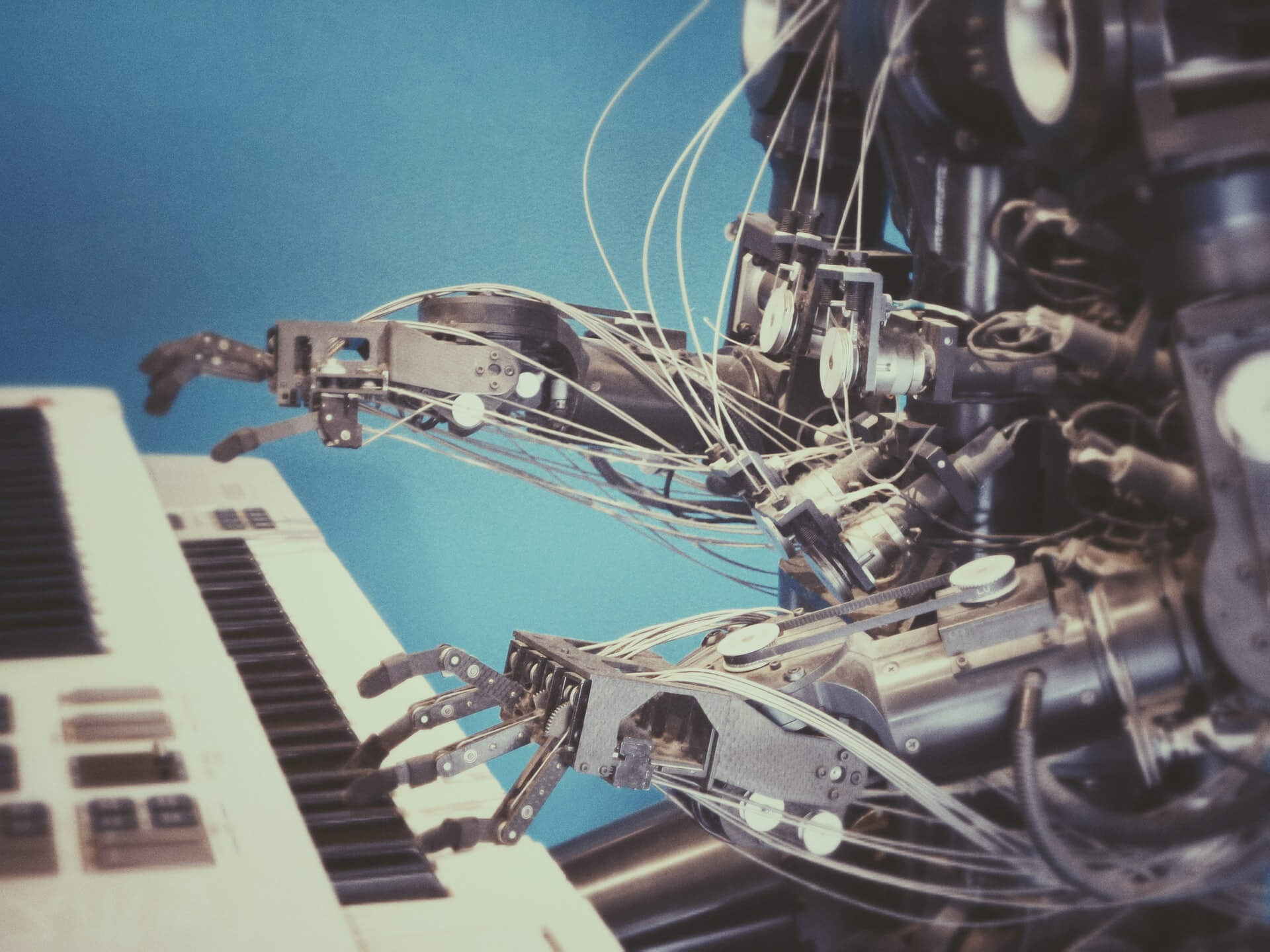
AI is the future of computer programming. In traditional programming, code is a series of rule-based decisions in highly complex conditionals. An advanced AI system will soon be able to run and manage the software development cycle by itself, understanding the core of a code. By now, AI helps human programmers navigate the increasingly complex number of APIs, making coding easier for developers.
Automated Network Management
Moreover, AI automates processes of running and managing company networks. AI, with its ML capabilities, is able to spot problems as they occur and take needed measures in order to bring the network back into a stable operating state.
Read more about current AI innovations.
AIOps: AI for IT Operations
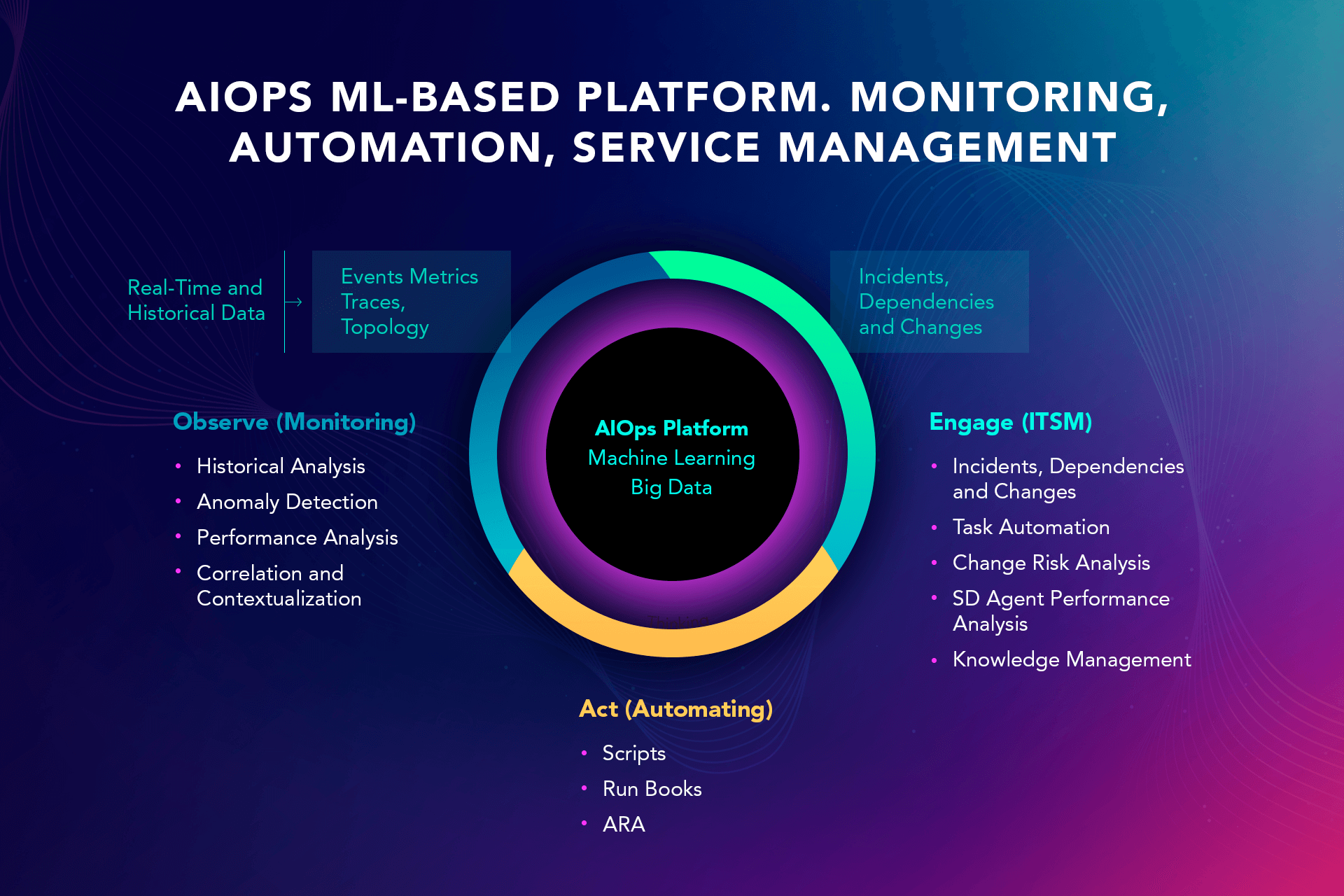
The term “AiOps” was first coined by Gartner and refers to using AI to manage information technology based on a multi-level platform. Specifically, AIOps uses big data, analytics, and machine learning capabilities to automate data processing and decision-making. The AIOps platform enables comprehensive insight into past and present states of IT systems based on the analysis of real-time and historical data.
Gartner defines AIOps as “platforms and software systems that combine big data and AI or machine learning functionality to enhance and partially replace a broad range of IT operations processes and tasks, including availability and performance monitoring, event correlation and analysis, IT service management, and automation.”
Based on AI technology, AIOps simplifies IT operations management and accelerates problem resolution in complex IT infrastructures.
“IT operations are challenged by the rapid growth in data volumes generated by IT infrastructure and applications that must be captured, analyzed, and acted on,” says Padraig Byrne, Senior Director Analyst at Gartner. “Coupled with the reality that IT operations teams often work in disconnected silos, this makes it challenging to ensure that the most urgent incident at any given time is being addressed.”
Continuously increasing volume from primary data collection systems, the constant rise of information sources, and the ongoing enhancement of system modifications complicate the performances of IT companies. AIOps is a great solution to tame the immense complexity and quantity of data.
According to Gartner, using AIOps and digital experience tools to monitor applications and infrastructure will rise from 5% in 2018 to 30% in 2023.
To gain most of the AIOps platform, you have to be careful and make sure that you have chosen an AIOps platform that can meet your goals. The main feature a platform should have are:
- Accumulated data management;
- Stream data management;
- Log reception;
- Receive data packets;
- Reception of digital indicators;
- Reception of documents;
- Automated pattern discovery and prediction;
- Anomaly detection;
- Identification of the true source of problems.
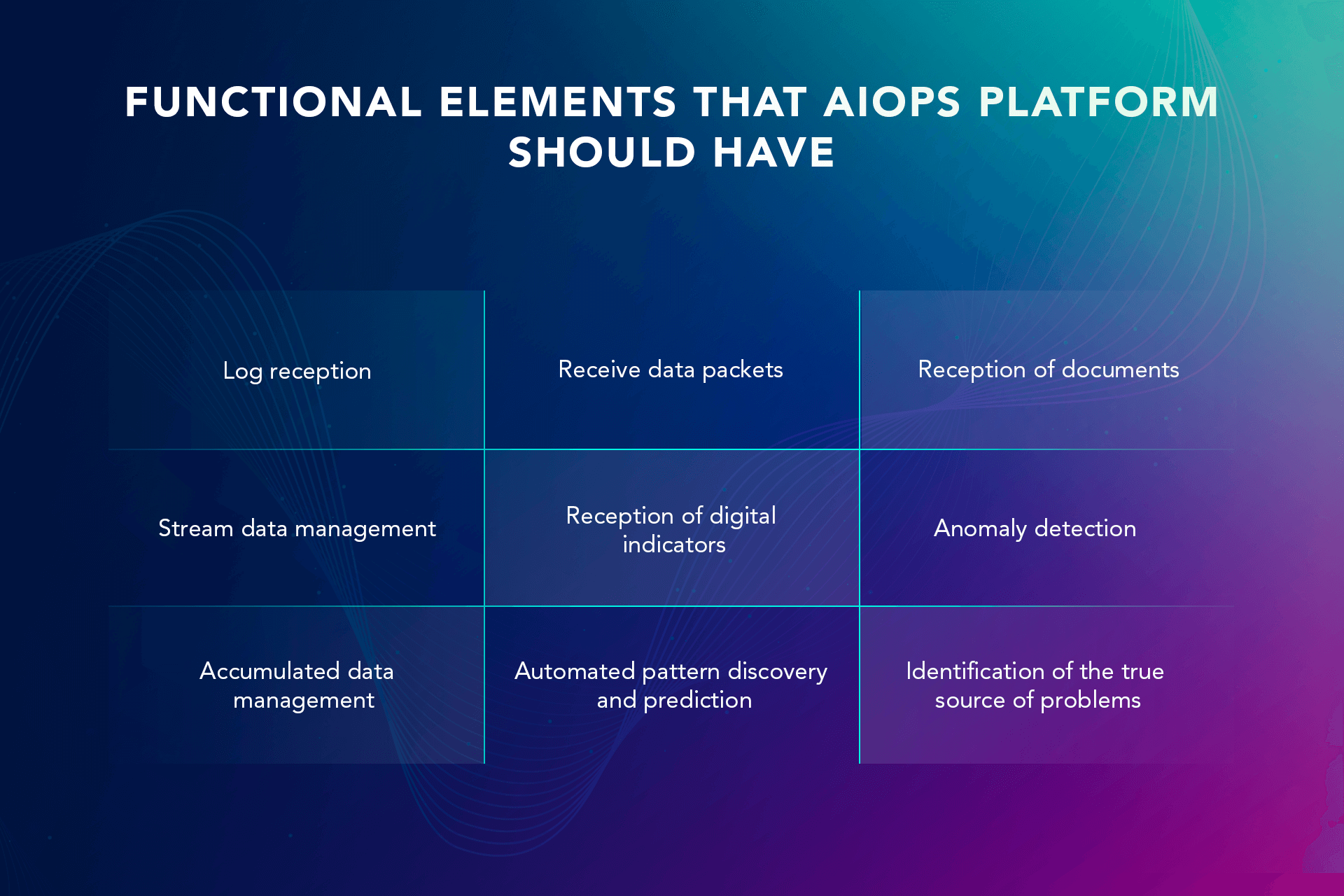
The availability of these elements will help IT companies to solve critical, unpredictable, and high-value issues instead of getting bogged down by the overwhelming amount of mostly irrelevant IT data.
Final Word
The rapid rise of innovative technologies has led to more intelligent and efficient businesses. To resolve and prevent high-severity outrages, the IT industry turns to Artificial Intelligence. Its Machine Learning and Deep Learning capabilities allow AI to transform traditional IT operations, making them smart, time-saving, and efficient. Quality Assurance, Service Management, and Process Automation are the main areas in which AI has proved to be an effective tool. Moreover, the concept of AIOps offers a better and more productive way to manage IT operations.




